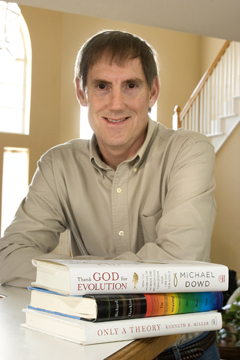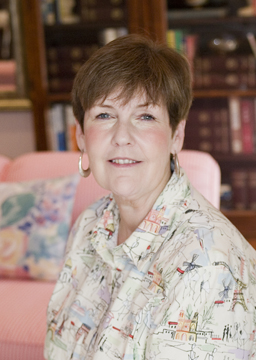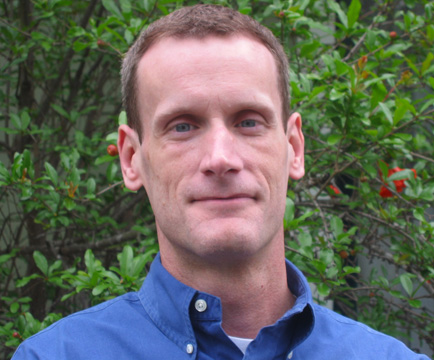The fight is on over teaching “intelligent design” in Texas schools.
By Laurie Barker James
Regularly updating the subject matter taught in public schools would seem such a basic good idea as to be a no-brainer – and noncontroversial. Who would want their kids learning from history textbooks, for example, that end with the Soviet Union still intact or literature classes that cover only the works of dead white guys from Europe who wrote with lots of where-art-thou’s?
The Texas Education Agency reviews each subject matter area, from kindergarten through high school, once a decade. A committee of teachers spends months studying the curriculum, recommending what new material should be added and outmoded information eliminated. Then the proposal goes to the 15-member elected State Board of Education for review, and the public gets to comment.
This summer and fall, the science curriculum comes under scrutiny. But far from being a yawner, the review may turn out to be a key battleground between scientists and science teachers on one hand and the religious right on the other.
The basic fight is expected to be over what kids are taught about evolution – which takes up only about three days of teaching in a 180-day school year. But scientists and teachers argue there are much bigger things at stake: the intimidation of teachers and the possible beginning of biblical beliefs being taught as science in Texas public schools.
Those teachers believe that for the religious right – or any religious group – to be able to dictate what is taught, or how, on any scientific subject undermines science education. They believe the religious right is confusing the debate by talking about how evolution is “only” a theory and that ideas like creationism or “intelligent design” should be given equal weight. While many elected officials in this country, including even Alaska governor and presumptive Republican vice presidential nominee Sarah Palin, say that a “healthy debate” on creationism is possible, for scientists that’s almost akin to equating rock-solid math principles with a religious debate on how many angels can dance on the head of a pin.
Science teachers like Kevin Fisher say evolution is not a complex idea. “First-graders are capable of understanding evolution,” said the science coordinator for Lewisville public schools, who is a player in the curriculum review process. “It’s descent with modification, or how things change over time.”
Simple it may be, but Texas science teachers report that they’re now unsure what they can say to their classes or how they can say it. Steven Schafersman, president of Texas Citizens for Science, said that the current educational climate “intimidates [science] teachers” to pressure them “to avoid or minimize” the topic of evolution.
The fact that none of the other science teachers interviewed for this article wanted their names used would seem to back up his allegation of fear in the teaching ranks. All but Fisher said they believe that any statement with their names on it could come back to them in the form of a pink slip. And they may be right. Just ask Christine Comer.
Comer, formerly the director of science curriculum for the TEA, alleges that she was forced to resign last October after she sent out an e-mail announcing that renowned author Barbara Forrest was coming to speak in Austin. Forrest, author of Creationism’s Trojan Horse: The Wedge of Intelligent Design, is a philosophy professor at Southeastern Louisiana University. The notice went out to a listserv of educators to whom Comer routinely sent information about speakers and resources.
“I sent the e-mail as an ‘fyi,’ not as something formally endorsed by TEA,” Comer said. Because evolution is included in the state’s current science curriculum, she maintains, it was completely proper for her to make her colleagues aware that a nationally known expert on the subject was coming to town.
Roughly two hours later, Comer was called into her supervisor’s office and handed an e-mail written by Lizzette Reynolds, who’d just been appointed by Gov. Rick Perry as the TEA’s commissioner for statewide policy and programs. Reynolds had received a copy of Comer’s message and deemed it both “potentially an offense” and contrary to TEA policy of “remaining neutral” on the subject of creationism. She recommended that Comer be reassigned or fired. First, Comer was told to send a second e-mail with a disclaimer. Then, she said, TEA administrators told her to choose between being fired – potentially putting her retirement funds and other benefits into jeopardy – and quitting her job.
TEA officials said that there were legitimate reasons for Comer’s dismissal, unrelated to the events in October, although the timing seems suspicious to many observers. According to TEA officials, Comer’s termination was related to “repeated acts of misconduct and insubordination,” and it was coincidental that the “last straw” coincided with a fairly controversial issue. A Nov. 5 memo from Monica Martinez, then the TEA’s acting curriculum director, recommended the termination, noting that Comer had been “counseled” previously that year about “exercising good judgment … when sharing information regarding science education in Texas.”
Comer filed suit in July against the agency and Education Commissioner Robert Scott, alleging she was illegally fired for “contravening an unconstitutional policy at the TEA.” She charges that the policy requiring employees to be neutral on the biblical interpretation of the origin of humans is illegal, since the U.S. Supreme Court has ruled that teaching creationism as science in public schools is illegal. The Texas attorney general’s office, on behalf of the TEA, has made a motion to dismiss Comer’s lawsuit.
The TEA is being cautious in its public statements about science curriculum, in part, officials said, because the review process is in its early stages. But the issue of what state employees and teachers can and cannot say has deep roots in Texas’ conservative government.
The process of chipping away at the theory of evolution in Texas science curriculum actually began with Texas Proclamation 95 in the mid-1990s. Signed by then-Gov. George Bush, the proclamation requires basic biology textbooks to “formulate, discuss, critique, and review hypotheses, theories, laws, and principles, and their strengths and weaknesses.”

Opponents of the theory of evolution, who are variously called creationists, Young Earth believers, or anti-Neo-Darwinists, have laid the groundwork both nationally and in Texas over the past decade to turn the relatively simple task of curriculum development into a fight over the basic theory of how humans came to be. Whatever you call them, this group of mostly fundamentalist Christians believes in biblical inerrancy. In recent years, many of them have lined up behind the concept of “intelligent design,” which attempts to use scientific terminology to promote the idea that, as it says in Genesis, the world was created in six days. If the Bible is correct, the proponents say, the Earth is very young – less than 7,000 years old.
The Austin-based Texas Freedom Network, which says its members include more than 30,000 religious and community leaders, watches “far-right issues” affecting Texas schools. In the early 1990s, TFN began charting the religious right’s progress in turning what the network calls “a sleepy corner of Texas government” – the State Board of Education – into a battleground over issues such as the theory of evolution.
Dan Quinn, communications director for TFN, said that Texans have “elected a board with a bloc of ideologues who care more about promoting their own personal agendas than educating Texas kids.”
According to TFN, the 2006 elections brought the number of SBOE members with religious right affiliations to seven – one short of a majority. Pat Hardy, who represents Tarrant County on the board, is a relatively conservative Republican and one of the few board members who’s actually a teacher. As a Christian, Hardy believes that God is responsible for the creation of the universe. As an educator who taught for more than 30 years, she sees the danger in pushing religion into the state’s public school science curriculum, a stance that causes considerable heartburn for more conservative Republicans.
In her recent primary battle to keep her education board seat, Hardy had the dubious distinction of being branded a “RINO” by some members of her own party. A “Republican in name only” runs the risk of challenges from more conservative candidates, backed by a mega-church or two. Hardy said that her 2006 opponent, Dr. Barney Maddox, never attacked her personally but used campaign materials that fed the allegation of “weaknesses” in the current science theory.
During the campaign, Maddox refused to talk about his position on evolution. However, his affiliations seem to confirm his ideological leanings. As a doctor, Maddox was tapped more than a decade ago to sit on the state review panel for high school biology textbooks. He condemned one potential textbook (Prentice Hall’s Biology: The Living Science) because, he said, the book “violated state law [Proclamation 95] requiring discussion of scientific weaknesses of evolution.” Maddox also wrote an article for the Institute for Creation Research, in which he is credited as “author of the biological sciences course material for the Creationist Worldview distance education program offered by ICR.”
Hardy won re-election this spring, and the SBOE remains, for the time being, tenuously balanced.
In the curriculum revision process that began earlier this year, some teachers’ groups have accused the SBOE of smokescreening its true agenda, a charge that the SBOE leadership denies. David Bradley, a Republican board member from Beaumont, has been quoted as saying that, during the science curriculum revision process, “the only thing this board is going to do is ask for accuracy.” Conservative board members have denied that there will be any controversy, unless liberal-thinking groups like the Texas Freedom Network bring it.
Schafersman, of Texas Citizens for Science, said Bradley is being disingenuous at best. “The intent of the SBOE creationists is to ask for misrepresentation of science, not for accuracy,” he wrote in an e-mail. “What Bradley and his colleagues actually plan to do is damage evolution instruction by trying to get the new science standards to include [lessons on] alleged but false ‘weaknesses’ of evolution, in order to weaken evolution content, confuse students, and make them think science is less accurate and reliable about biological origins than it really is.”
Don McLeroy, a Bryan dentist, is the current State Board of Education chairman. As a medical professional, his credentials for board membership might seem impeccable. However, McLeroy, who was appointed by Perry, is also an evangelical Christian who rejects the theory of evolution. Quoted in The New York Times on June 4, McLeroy said his rejection of evolution – “I just don’t think it’s true or it’s ever happened” – is not based on religious grounds.
“My personal religious beliefs are going to make no difference in how well our students are going to learn science,” he said in the interview.
That may be true. But the decidedly anti-evolution slant of McLeroy and his conservative colleagues on the education board may make that difference.
In an interview with the San Antonio Express-News on May 31, Bradley told a reporter, “Evolution is not fact. Evolution is a theory and, as such, cannot be proven.”
Statements like that – throwing around terms like theory and hypothesis and guess as though they were interchangeable – just illustrate the problem, as far as Lewisville’s Fisher is concerned.
In layperson’s terms, if you say, “It’s just a theory,” that usually means you’re talking about a guess, or something unproven. But Fisher said that, in the precise language of science, a theory is something that has been rigorously tested, reviewed by scientists, modified when new evidence becomes available, verified by repeated experimentation, and has become part of the scientific consensus. A theory differs from a law in that a law governs a single action, like the law of gravity. A theory, on the other hand, explains a whole series of related phenomena, like the theory of relativity. A hypothesis, Fisher said, is a guess that hasn’t been through that scientific process of being tested and proved up. And creationism, which is based on biblical interpretation, isn’t even a guess: It’s a belief, based on faith, he said.
“A theory isn’t a guess,” Fisher said. “Science deals with natural explanations which are testable.” In that context, he said, “evolution can be proven. The evidence is overwhelming.”
Teachers like Fisher, with science backgrounds, and scientists like Schafersman believe that evolution is a concept critical to the understanding of all of the sciences. A former geology professor, Schafersman said his biggest criticism of the state board’s process is that most of the elected officials who will formally approve the curriculum are not educators. And in this case, he said, the fact that most also are not scientists can make a huge – and dangerous – difference for Texas students.
The lack of science background on the part of most state board members means they may not understand that creationism is a belief, not a scientific theory, like evolution, that is subject to being proved.
The idea that divine guidance played a part in the creation of the world – the basis of “intelligent design” – “is a possibility, but we have no way of testing it,” Fisher said.
However, that doesn’t stop “ID” proponents from touting it as a credible scientific theory or, conversely, attempting to discredit evolution with the words, “It’s just a theory.”
Chief among the proponents of intelligent design are the “fellows” at the Discovery Institute in Seattle. According to its web site, the institute’s Center for Science and Culture is run by a group of “more than 40 … biologists, biochemists, chemists, physicists, philosophers and historians of science, and public policy and legal experts.” The web site states that the institute is not a religious organization and also maintains that intelligent design is not the same as creationism.
One of the center’s primary goals is to support research by scientists and other scholars challenging various aspects of Darwinian theory. The CSC’s leaders have advanced degrees – but they aren’t scientists: Director Stephen Meyer has a Ph.D. in the history and philosophy of science, while Associate Director John G. West holds a doctorate in government.
One of the hallmarks of the institute, according to many scientists, is that the CSC generates pseudo-scientific research, done by researchers with Ph.D. credentials, to bolster claims concerning intelligent design, to build support for that idea as a credible scientific theory. Of course the proponents of intelligent design also include those with legitimate hard-science backgrounds, like McLeroy and Maddox.
The argument at the root of the issue is biblical inerrancy, a doctrine as old as the Christian church itself. Nicholas Copernicus and Galileo Galilei, early scientists and Christians, challenged the Catholic Church’s doctrine on the Earth as the center of the universe.
We can now demonstrate that the Earth moves around the sun, not vice versa. Back before the Protestant Reformation, however, even scientific evidence drew a penalty when it came into conflict with accepted interpretation of what the Judeo-Christian Bible (which had been translated from Hebrew to Aramaic to Greek and then Latin at that point) said. Perhaps it’s fittingly ironic that Charles Darwin, who proposed the theory of evolution in the mid-1800s, was first a ministry student before a voyage aboard the Beagle changed the course of his future. Now people of diverse faiths – clergy as well as laypeople – accept the theory of evolution and want to see it taught in schools. The TFN’s Quinn says that many people of faith do not believe evolution to be “anti-God.”
“We can honor the faith of all Texans by teaching sound science in science classrooms and leaving personal views of the creation of the world to families and houses of worship,” he said. “As a person of faith, I find it insulting when it’s implied that those who want their kids to get a sound science education aren’t ‘Christian enough.’ “
Ralph Mecklenburger, the rabbi at Fort Worth’s Beth-El Congregation, has been paying attention to the debate about Texas’ science curriculum. As an expert in the Torah, or Old Testament, upon which the proponents of intelligent design base their theories, the rabbi is concerned with misinterpretation.
“Has evolution been demonstrated experimentally? Yes, many times,” he wrote in an e-mail. “Intelligent design, on the other hand, may be true, but until someone comes up with a way to test it, it will not be science.”
Many scientists echo Mecklenburger’s statement that, despite challenges, the theory of evolution has held up for more than a century. Those scientists and many teachers believe that intelligent design proponents ignore the proofs and use outdated information to hammer away at accepted science. Historically, Jews found the Bible to be “full of memorable ways to teach values, but we know it is not science,” Mecklenburger said. “We deny that science and religion conflict, but that is because we recognize that the Bible is about religion, not about science.”
The Discovery Institute was the prime source of information for a group of school board members in Dover, Pa., who, like the seven Young Earth philosophists on the Texas SBOE, wanted to put forth their version of natural history. In 2004, Dover school administrators, at the insistence of the district’s board, added the following sentence to the biology curriculum: “Students will be made aware of the gaps/problems in Darwin’s theory and of other theories of evolution including, but not limited to, intelligent design.”
Other school trustees resigned in protest, and science teachers refused to read the statement to their students, citing a part of the Pennsylvania code of education stating that teachers cannot present information they believe to be false. The American Civil Liberties Union filed suit on behalf of 11 parents with children in the district, and the case went to trial in September 2005. Discovery Institute fellows were listed initially as key witnesses, but the defense case unraveled as it became clear that, despite their protests, the proponents of intelligent design actually did have religious motivation and were using religious theory.
That December, U.S. District Judge John Jones ruled that the Dover board was using religious materials, which was unconstitutional. In his 139-page ruling, Jones wrote that “a significant aspect of intelligent design movement is that, despite defendants’ protestations to the contrary, it describes intelligent design as a religious argument.” The writings of leading ID proponents, he said, “reveal that the designer postulated by their argument is the God of Christianity.” The judge further noted that “making students aware” of the alternative hypotheses to evolution is in essence the same thing as teaching them about it, and, under current law, promoting religion in the public school classroom is not acceptable.
The Discovery Institute’s policy of promoting intelligent design as secular science was thwarted in Pennsylvania, but it may well reappear in Texas. According to Comer, the issue of intelligent design isn’t problematic just for biologists.
“People who teach astronomy have already been verbally attacked in workshops discussing the Big Bang theory and the idea that the Earth is 14 million years old,” she said. “It’s an area I never would have thought would be controversial.”
Comer also said she thinks that the process of science curriculum review is more “secretive” this year. However, according to Debbie Ratcliffe, TEA’s director of communications, that’s not true.
“We just started [the curriculum review] in January,” she said. “A year is the standard time frame for this kind of review. We’re following the normal process.”
Hardy, the Tarrant County member of SBOE, said the education board is scheduled to take an initial vote on the science curriculum recommendations in January 2009, with the final vote in March.
A lot can happen between then and now. Bradley, one of the SBOE’s most vocal evolution opponents, is up for re-election, and his opponent, Democrat Laura Ewing, is a Pearland educator. Ewing’s campaign slogan is “Special interest groups have derailed Texas education.”
Ratcliffe said that the public will have ample time for comment. Experts are currently composing drafts, according to the TEA’s schedule, and the SBOE will have another “discussion” about the science curricula in November. She said the public can comment now, or at any of the meetings between November 2008 and March 2009, as well as via the agency’s web site. However, as of Tuesday, there was no official link on the TEA’s web site to post public comment about the science curriculum. Science teachers and their advocates are urging interested Texans to write directly to TEA Commissioner Scott or to their local SBOE members now – and not to wait until the official proposal is released in January.
Religiously conservative states like Texas, Louisiana, and Florida are all facing the same kind of challenge to their science curricula. It could happen in other states as well, but in Texas, a small number of citizens with a particular ideological viewpoint have been elected to positions of power. In addition to the probable threat of lawsuits filed on behalf of parents if any part of the theory of intelligent design makes its way into Texas textbooks, the issue poses other problems, not only for Texas children but for the nation. 
“Right now, what the SBOE does will determine whether the next generation of Texas public school students get a 19th-century education in their 21st-century classroom,” said Quinn. “The adoption of the science curriculum will determine whether students will be prepared to succeed in college and jobs of the future, or whether their education is subordinated to the views and beliefs of a fringe group of SBOE members.”
What happens here will also ripple through the textbooks of other states. Texas, the second-largest purchaser of textbooks (behind California) spent more than $25 million in the 2004-2005 school year on high school biology texts alone, which means that publishers create books based on the needs of Texas schools.
Quinn also warned that the science curriculum may go the excruciating way of the language arts curriculum review process, completed earlier this year. Experts in language arts – teachers and volunteers – worked for three years to develop a new curriculum, only to have their work thrown out by the SBOE (Static, May 21, 2008). Asked why the board rejected the recommendations of acknowledged experts, SBOE chair McLeroy told reporters at the time that, “My experts are Winston Churchill and common sense.”
Quinn called the statement “arrogance and willful ignorance.”
“Just like teachers wouldn’t know better than Dr. McLeroy how to fill a cavity, he does not know better than [the educators] how to educate Texas children,” he said.
Laurie Barker James is a local freelance writer.










